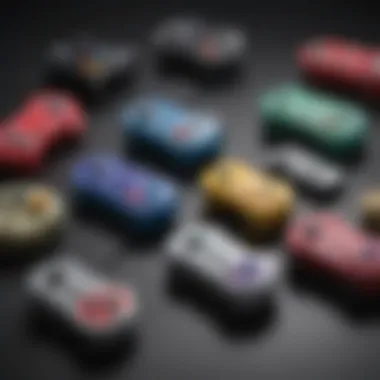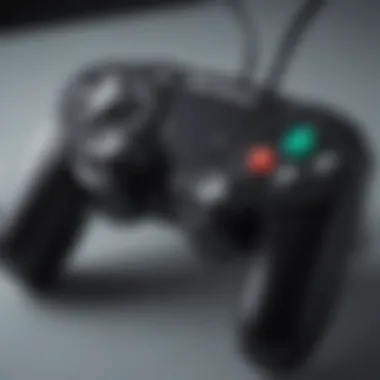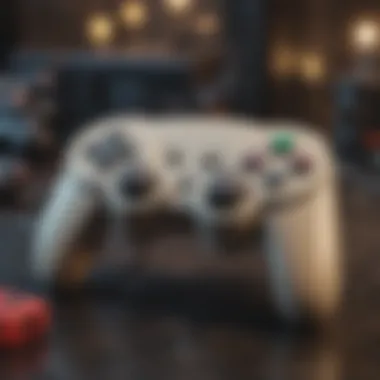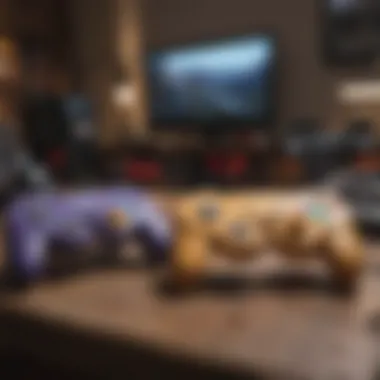The Ultimate Guide to GameCube Controllers for Switch


Intro
The Nintendo Switch has become a versatile platform for gaming enthusiasts. The ability to play both new titles and classic favorites attracts many players. Among these classics, the GameCube titles have a special place in the hearts of many. To fully appreciate these games on the Nintendo Switch, a quality GameCube controller is essential. The options in the market vary widely, featuring both wired and wireless models. Each type offers distinct advantages and considerations. Therefore, it is crucial to evaluate the best GameCube controllers available for the Switch, focusing on their features, performance, and compatibility.
In this article, we systematically analyze several prominent GameCube controllers. We will look at what makes each model unique, guiding gamers in making informed decisions. Whether you prefer the feel of wired controls or the freedom of wireless options, this guide aims to enhance your gaming experience considerably.
Game Reviews
Overview
GameCube controllers designed for the Nintendo Switch come in several different shapes, sizes, and functionalities. Some emphasize comfort, while others focus on performance. Understanding the key aspects of these controllers helps users decide which suits their gaming style best.
Gameplay
Gameplay can vary significantly based on controller choice. For example, a wired controller may offer faster response times than wireless ones. This can impact competitive gaming scenarios where every millisecond counts. On the other hand, some players appreciate the flexibility of wireless controllers, especially when playing from a distance.
Storyline
While controllers do not dictate the storylines of the games themselves, the immersion experienced can be significantly affected by controller comfort and responsiveness. The nostalgia associated with GameCube games often enhances the desire for a suitable controller that echoes that past experience.
Graphics
Graphics may not directly relate to controller quality; however, graphic performance plays a role in overall gameplay experience. Controllers that facilitate better handling can improve interaction with graphics, especially during complex scenes or fast-paced action.
Soundtrack
Again, while soundtracks do not change based on the type of controller used, the audio experience during gameplay may improve with the right controller. Ensuring a fluid gaming performance through the controller can enhance audio reactions and results in a better overall experience.
Pros & Cons
- Wired Controllers
- Wireless Controllers
- Pros:
- Cons:
- Lower latency
- Increased reliability
- Limited mobility
- Tangle issues
- Pros:
- Cons:
- Greater freedom of movement
- No cable management concerns
- Potential connectivity issues
- Battery life concerns
Final Verdict
When grappling with choices, consider personal preference and gameplay style. A wireless controller may suit casual players who enjoy comfort and freedom. In contrast, more competitive players might benefit from the reliability of wired controllers. Both have merits that need to be weighed according to the gaming context.
Prologue to GameCube Controllers and the Switch
The relevance of GameCube controllers in the context of the Nintendo Switch has gained considerable attention. With the nostalgia surrounding classic games, many gamers seek to enhance their experience by using controllers that create a bridge between old and new gaming eras. GameCube controllers are known for their distinctive design and tactile feedback. This offers a gameplay experience that some players find comforting and familiar, especially when revisiting classic titles from the GameCube era.
The introduction of the Nintendo Switch has made compatibility with legacy controllers more significant. Switch's hybrid nature allows gamers to enjoy both handheld and docked gaming. Thus, the ability to connect GameCube controllers opens up new possibilities for gameplay. Understanding how GameCube controllers fit into this modern console landscape is essential for gamers who seek the best performance and comfort.
As we explore the historical context and compatibility of GameCube controllers, this article aims to provide a comprehensive guide for gamers. Focusing on both technical specifications and user feedback will help in determining the best options available today.
Evaluating Key Features of GameCube Controllers


Understanding the best GameCube controllers for the Nintendo Switch involves examining several fundamental features. Evaluating these key elements helps gamers select a controller that effectively enhances gameplay. It is essential to focus on design, usability, and input capabilities, as these aspects directly affect the gaming experience. Each of these features contributes to usability and comfort, important factors for long gaming sessions. In the following sections, we dive deeper into specific features that are vital when assessing GameCube controllers.
Ergonomic Design Elements
Ergonomic design is more than just aesthetics; it significantly impacts player comfort. Controllers that fit well in the hand reduce strain during extended play. This includes considering weight, shape, and grip texture. For instance, a controller that is too heavy can lead to fatigue, while one that is too light might feel insubstantial. Controllers with textured grips often provide better control and reduce slippage.
Moreover, the placement of buttons and analog sticks also falls under ergonomic design. If buttons are positioned within easy reach, player responses become quicker. Many original GameCube controllers were designed with an adult-sized hand in mind, which may not accommodate smaller hands comfortably. This is an essential consideration when choosing the right controller, especially for younger gamers.
Button Layout and Response
The button layout and response time of a controller can profoundly affect gameplay. GameCube controllers are known for their distinctive button arrangement. This layout contributes to a more intuitive gaming experience, making it easier to execute complex moves in fast-paced games.
The responsiveness of the buttons also plays a crucial role. High-quality controllers feature distinct, tactile feedback that indicates when a button has been pressed. This kind of feedback is vital for precisely timed inputs, such as jumps and special moves in games like "Super Smash Bros." or "Mario Kart." A poor button response time can lead to frustrating gameplay, which is why this aspect must not be overlooked.
Analog and Digital Input Capability
When discussing GameCube controllers, one cannot ignore the importance of analog and digital inputs. This dual capability allows for nuanced control in a variety of games. Analog inputs provide the ability to finely tune a character's speed or direction, which is especially crucial in racing or platforming titles. Digital inputs, however, serve well for quicker, binary commands.
Some modern GameCube controllers incorporate advanced sensor technologies to improve this experience. The quality of feedback from analog sticks can create a more immersive gameplay experience. Gamers often rely on small movements for precision, thus a controller that balances analog sensitivity with digital functionality can enhance gaming performance significantly.
Analog and digital capabilities are essential for engaging gameplay, particularly in competitive scenarios.
Through this exploration of ergonomic design, button layout, and input capabilities, it is easier for consumers to make informed choices about GameCube controllers. With the vast array of options available, understanding these features can lead to a more satisfying gaming experience.
Wired vs. Wireless GameCube Controllers
The discussion around wired versus wireless GameCube controllers is crucial for gamers looking to optimize their experience on the Nintendo Switch. Each type of controller offers distinct advantages, which can significantly influence gameplay and comfort. When making a choice, it’s important to weigh several factors, including response time, mobility, and overall user experience alongside game compatibility. The decision can affect not only performance metrics but also the immersion level during gameplay.
Advantages of Wired Controllers
Wired GameCube controllers hold several benefits that appeal to many players. One of the primary advantages is the low latency. A wired connection typically ensures a quicker response time compared to wireless options. This can be particularly valuable during competitive gaming sessions where every millisecond counts. Moreover, wired controllers do not rely on batteries, so players need not worry about expiration during gaming marathons.
Additionally, the install and play nature of wired controllers simplifies the process. Connect the USB directly to the Nintendo Switch and the device is ready for use with no additional setup. This can benefit gamers who may not be very technical or do not wish to deal with potential issues that sometimes arise with wireless connections, such as connectivity fluctuations or disconnections.
Maintaining a significant distance from the console is also not a concern with wired controllers, which can be a necessary factor for some setups.
Benefits of Wireless Controllers
On the other hand, wireless GameCube controllers provide substantial flexibility and convenience. The primary advantage is freedom of movement. Without being tethered to the console, players can find a comfortable position, which enhances the overall gaming experience. This feature can be vital for couch gaming or parties where several players are involved.
Wireless controllers often come with ergonomic design considerations that can increase comfort during longer gaming sessions. Many models include features like soft-touch materials and strategically placed grips, which adapt well to diverse hand sizes.
Battery life is also an important aspect. Many wireless controllers now feature long-lasting rechargeable batteries, allowing for extended gameplay without frequent interruptions. Additionally, modern wireless technology minimizes input delay, making them suitable even for fast-paced gaming genres.
In summary, the choice between wired and wireless GameCube controllers ultimately depends on personal preference and gaming style. Each type has its unique benefits that cater to various gamer needs and preferences.
Top GameCube Controller Options for Nintendo Switch
Choosing the right GameCube controller for the Nintendo Switch is crucial for both avid gamers and casual players alike. The right controller can enhance gameplay, improve comfort, and elevate the overall gaming experience. With multiple options on the market, it is essential to evaluate the specific features, performance metrics, and user experiences of each controller.
Official Nintendo GameCube Controller
Design and Specifications
The design of the Official Nintendo GameCube Controller reflects a balance between nostalgia and modern gaming. It features the trademark controller layout with a compact shape, which many gamers find comfortable. The controller measures approximately 5.9 x 5.5 inches and weighs around 0.5 pounds, making it easy to hold for extended periods.
One key characteristic of this controller is its distinct button configuration. It includes a large A button, four shoulder buttons, and a joystick that is responsive and precise. This design contributes to its popularity. Additionally, the controller comes with a sturdy cable that connects directly to the Switch dock.


However, one drawback is the rigidity of the cable itself. Some users prefer a wireless option for freedom of movement.
Performance Overview
The performance of the Official Nintendo GameCube Controller is widely recognized. Gamers often praise its highly responsive buttons and smooth joystick movements. This responsiveness is essential for competitive gameplay, especially in fast-paced games.
The controller operates without lag, ensuring actions are translated immediately on the screen. The build quality is also commendable, generally holding up well under rigorous use. However, in comparison to wireless models, some players find the wired connection limiting in terms of mobility.
User Feedback
User feedback for the Official Nintendo GameCube Controller is largely positive. Many users highlight the controller’s nostalgic value, having an emotional connection to it from previous Nintendo consoles. Reviewers often mention reliability and performance consistency as significant advantages.
There are, however, some critiques. A few users have reported that the length of the cable is not sufficient for larger setups. Overall, the user feedback reinforces the controller's reputation as a top choice.
PowerA GameCube Style Wired Controller
Features and Build Quality
The PowerA GameCube Style Wired Controller is designed with features that mimic the original GameCube controller while adding some contemporary enhancements. Weighing about 0.6 pounds, it has a slightly different feel due to its materials but retains a familiar shape.
Its notable feature is the inclusion of additional buttons that cater to modern gaming needs, such as the capture button designed for Switch functionality. While build quality is solid, it lacks the heft and feel of the official model, which some gamers may not prefer.
Comparative Analysis with Official Model
When comparing the PowerA model to the Official Nintendo GameCube Controller, performance metrics vary. The PowerA controller's buttons are responsive, yet they may feel less tactile than the originals. Gamers who prefer a firmer button press often stick with the official controller for this reason.
Additionally, the cable of the PowerA controller is of shorter length compared to the original. This may hinder gameplay, especially in larger gaming setups.
Customer Ratings
Customer ratings for the PowerA GameCube Style Wired Controller are mixed. While many appreciate the affordability and design, some have expressed concerns regarding durability. Users indicate that after extended use, the controller may not respond as effectively as the original.
The controller holds decent ratings overall, but those looking for long-term use might consider investing in the official option.
Hori Wireless GameCube Controller
Wireless Functionality Assessment
Hori’s Wireless GameCube Controller offers a reliable wireless option for gamers. It uses Bluetooth technology, allowing for seamless connectivity with the Nintendo Switch. This feature eliminates the frustration of tangled wires, making gameplay more enjoyable.
One significant advantage is the range. The wireless controller connects reliably up to about 30 feet, giving players the freedom to move around. This feature significantly enhances the gaming experience, especially in multiplayer settings.
However, users have reported occasional connectivity drops during gameplay, which can be frustrating in high-stakes situations.
Comfort and Usability
Comfort is a key aspect of the Hori Wireless GameCube Controller. The lightweight design of the controller, about 0.4 pounds, makes it easy to handle for long periods. It features a similar form factor to the original GameCube controller.
Additionally, the ergonomic shape supports good hand positioning. However, the buttons feel a bit different in terms of feedback. Users may need time to adjust to this shift, especially if they are accustomed to the original design.
Overall Impression from Users
The overall impression from users on the Hori Wireless GameCube Controller is generally favorable. Many praise its wireless functionality and comfort. However, the mentioned connectivity issues sometimes overshadow its positive aspects. Despite this, many players appreciate its attempt to deliver a nostalgic experience with modern enhancements.
Aftermarket Alternatives
Unique Features of Aftermarket Controllers


Aftermarket controllers often introduce innovative features not found in the official selections. Many of these controllers incorporate customizable buttons and adjustable sensitivity settings, allowing gamers to tailor their experience.
One notable aspect is the aesthetic options. Aftermarket controllers typically come in various colors and designs, appealing to a broader range of preferences.
However, performance reliability can fluctuate across different brands, requiring diligent research before purchasing.
Performance Metrics
Performance metrics for aftermarket controllers can differ widely. Some brands excel in responsiveness, while others may struggle with input lag or durability.
Users should closely examine reviews and feedback to ensure they find a controller that provides balanced performance suited to their specific needs. This scrutiny is essential for gamers who value competitive gameplay.
Consumer Satisfaction Insights
Consumer satisfaction insights reveal a divided opinion on aftermarket controllers. While some users are satisfied with the customization options and unique features, others have encountered issues like comfort and longevity.
Reviews suggest that while you can find bargains, serious gamers should cautiously approach aftermarket options to avoid potential disappointment. Balancing price with reliability is crucial here.
Compatibility Challenges and Solutions
In the realm of gaming accessibility, the discussion around compatibility has risen to the forefront, especially when considering GameCube controllers for the Nintendo Switch. The seamless integration of older controller models with newer systems holds significant importance for long-term gamers. This section addresses the subtle nuances and potential obstacles that players may encounter when using GameCube controllers on the Switch. Understanding these factors is essential for optimizing the gameplay experience and ensuring the longevity of beloved gaming peripherals.
Compatibility with Various Switch Games
The Nintendo Switch boasts an extensive library of games, some of which are enhanced by the classic design of GameCube controllers. However, compatibility can be inconsistent based on titles, as not all games recognize the controller inputs effectively. For instance, many classic titles from the GameCube era, such as Super Smash Bros. Ultimate, have been specifically designed to accommodate these legacy controllers. On the other hand, some newer or unique Switch games may not support them fully, leading to a frustrating experience.
When considering compatibility, it is advantageous to check individual game listings and community feedback. Gamers often share insights on platforms like Reddit or gaming forums regarding which games perform optimally with GameCube controllers. Therefore, conducting preliminary research can save time and enhance your overall gaming experience.
Troubleshooting Common Connectivity Issues
Occasionally, users may face connectivity problems that hinder the optimal functioning of GameCube controllers with the Nintendo Switch. Solving these issues quickly is vital for maintaining an enjoyable gaming atmosphere. Here are some common problems and suggested solutions:
- Controller Not Detected: If your GameCube controller is not recognized, ensure it is properly connected. For wired controllers, check the connection point. For wireless options, ensure that Bluetooth pairing was successful.
- Lag or Delay in Input: A noticeable delay can disrupt gameplay. For wireless models, consider checking battery levels and proximity to the console. If issues persist, switching to a wired controller may be the most reliable option.
- Intermittent Disconnection: If a controller frequently disconnects, this could point to issues with the connection port or the controller itself. Make sure that both the console and the controller are updated to the latest firmware, if applicable.
By being proactive and aware of these challenges, gamers can mitigate the potential frustrations associated with using GameCube controllers on the Nintendo Switch. This knowledge empowers players to focus on gameplay rather than troubleshooting, enabling a more immersive and enjoyable experience.
Closure on Choosing the Right GameCube Controller for Switch
Selecting the most suitable GameCube controller for the Nintendo Switch requires careful consideration of multiple factors. Gamers must evaluate personal preferences, gameplay style, and practical needs. This decision not only influences user experience but also impacts performance in game environments, especially for titles that resonate with nostalgia.
One crucial element is the controller's design and ergonomics. An ergonomic controller promotes comfort during long gaming sessions, reducing fatigue and improving overall performance. The button layout plays a significant role as well. It should align with the player's instincts, ensuring swift and accurate input without a steep learning curve.
Additionally, the connectivity type (wired or wireless) can make a difference. Wired controllers often offer stability without worrying about battery life, while wireless controllers provide a greater range of movement, which is beneficial for multiplayer setups.
Moreover, understanding compatibility with different games is essential. Some games may have specific requirements that determine which controller will function optimally. Hence, checking whether a controller supports all desired titles is important to avoid any disappointments later on.
"The right controller can transform gameplay experiences, bringing joy and depth to every session."
Finally, it’s helpful to consider customer reviews and feedback. Real-world experiences of fellow gamers can provide insights that are not always evident from specifications alone. By integrating this information into the decision-making process, players can choose a controller that enhances their gaming experiences.
Summarizing Key Considerations
When choosing a GameCube controller for the Nintendo Switch, several key factors must be prioritized:
- Ergonomics: Comfort during gameplay is paramount. Look for designs that fit comfortably in the hands.
- Button Layout: Ensure that buttons are positioned logically and responsively.
- Connectivity: Determine the advantages of wired vs. wireless based on playing habits.
- Game Compatibility: Verify support across the titles you intend to play.
- User Reviews: Analyze feedback from other gamers to gauge real-life performance.
Future of GameCube Controllers in Modern Gaming
The landscape of gaming controllers is evolving. GameCube controllers have a unique standing due to their nostalgic relevance and proven performance in competitive play. They successfully capture the essence of classic games while applying to modern titles effectively. As technology progresses, manufacturers will likely enhance these controllers further.
With the introduction of features like programmable buttons and improved durability, the future may offer even more advanced options. Players might soon see hybrid models that blend classic designs with modern technology, offering both functionality and nostalgia.
Moreover, ongoing support for legacy games on platforms like the Nintendo Switch suggests a sustained interest in maintaining these beloved controllers. Enthusiast communities and aftermarket developers continue to innovate, ensuring that the GameCube controller remains relevant for both casual and competitive players alike.



